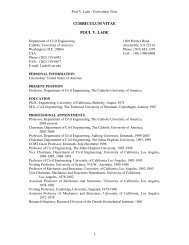Nota Bene-- C:\ARTICLES\TERMIN~1.NB Job 1 - the Catholic ...
Nota Bene-- C:\ARTICLES\TERMIN~1.NB Job 1 - the Catholic ...
Nota Bene-- C:\ARTICLES\TERMIN~1.NB Job 1 - the Catholic ...
You also want an ePaper? Increase the reach of your titles
YUMPU automatically turns print PDFs into web optimized ePapers that Google loves.
10:5-8 confirms that it is in accord with God’s word in <strong>the</strong> Law that Christ is <strong>the</strong><br />
termination of <strong>the</strong> Law as <strong>the</strong> way to righteousness.<br />
II. Antecedent Context: Romans 9:30-10:3<br />
Romans 10:4 occurs within <strong>the</strong> broader context of Rom 9-11, in which Paul<br />
focuses upon <strong>the</strong> problem that his fellow Israelites in general have not believed in what<br />
God has done in <strong>the</strong> Christ event. After sharing with his Roman audience his deep<br />
concern for his fellow unbelieving Israelites (9:1-5), Paul assures his audience that <strong>the</strong><br />
word of God, <strong>the</strong> basis for <strong>the</strong>ir own faith and hope, has not failed with regard to Israel<br />
(9:6-29). Paul <strong>the</strong>n shifts <strong>the</strong> vantage point of his rhetorical strategy. Whereas he<br />
previously invited his audience to consider <strong>the</strong> problem of unbelieving Israel primarily<br />
from <strong>the</strong> side of God (9:6-29), in 9:30-10:21 he bids <strong>the</strong>m to ponder <strong>the</strong> same problem<br />
primarily from <strong>the</strong> side of Israel. Paul’s rhetorical purpose in 9:30-10:21 is not just to<br />
document <strong>the</strong> fact of Israel’s stubborn unbelief but to demonstrate that faith is still<br />
eminently available to Israel. Everything <strong>the</strong>y need to turn and submit <strong>the</strong>mselves in<br />
faith to <strong>the</strong> gospel about Christ is patiently awaiting <strong>the</strong>m. Romans 10:4, <strong>the</strong>n, is part of<br />
Paul’s rhetorical strategy to impart to his audience <strong>the</strong> hope that all Israel will eventually<br />
believe and be saved (11:26). 7<br />
A. Romans 9:30-33<br />
Paul begins this new section (9:30-10:21) by employing <strong>the</strong> metaphor of running<br />
in pursuit of a goal to place an ironic contrast before his audience: “What <strong>the</strong>n shall we<br />
say? Gentiles who did not pursue righteousness have attained righteousness, indeed<br />
<strong>the</strong> righteousness from faith; but Israel who pursued <strong>the</strong> Law of righteousness did not<br />
arrive at <strong>the</strong> Law!” (9:30-31). 8 Surprisingly, Paul concludes <strong>the</strong> contrast not with an<br />
expected “Israel did not arrive at righteousness” but “Israel did not arrive at <strong>the</strong> Law.”<br />
Paul’s use of “Law” ra<strong>the</strong>r than “righteousness” as <strong>the</strong> unattained object of<br />
Israel’s pursuit in 9:31 serves a double purpose in his rhetorical strategy: 1) It leaves<br />
open <strong>the</strong> possibility that Israel can still arrive at righteousness, like <strong>the</strong> Gentiles, from<br />
3
















